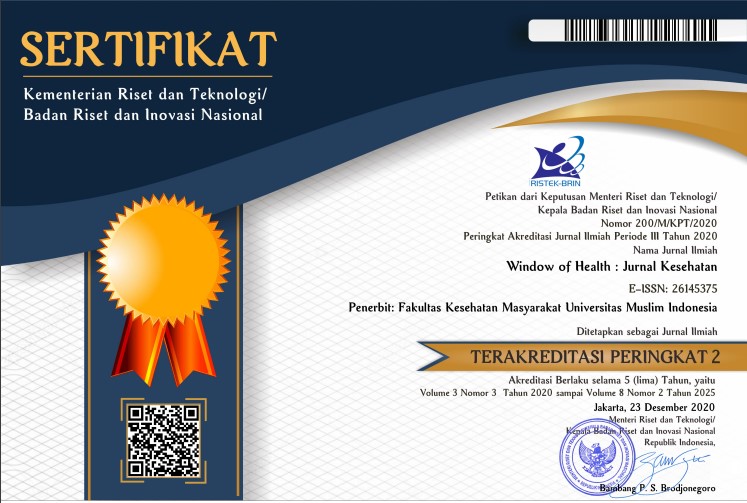Factor Related to Compliance to Participate in Family Planning Program in Bangkala Health Centre Working Area
Abstract
Family planning is an action to achieve prosperity through marriage counseling, treatment of infertility, prevention of unwanted pregnancies in married couples, regulating the number of children, and the spacing of childbirths. Family planning aims to improve health and welfare and create happy and prosperous small families by controlling birth rates and population growth. This study aims to determine factors related to family planning acceptors' adherence to family planning programs in the working area of the Bangkala Health Center. The type of research used is a quantitative design using a cross-sectional study design approach. The sampling used a non-probability sampling method with an accidental sampling technique; the number of samples was 290—analyzed with the chi-square correlation test. The results showed a significant relationship between knowledge and compliance with family planning acceptors (P-Value 0.000 <0.05). There is no significant relationship between health workers' support and family planning acceptors' compliance (P-Value = 0.867 > 0.05). Despite this, the role of health workers in supporting family planning acceptors is crucial and their efforts are highly valued. Based on the results of this study, it is hoped that the Bangkala Health Center will continue to improve counseling about family planning, primarily related to the use of contraceptive devices for family planning acceptors in the Bangkala Health Center work area so that family planning acceptors are expected to increase their understanding of family planning and raise awareness to comply with the family planning program.
References
U. Mutu et al., “Jurnal Kesehatan Perintis,” vol. 9, no. 2, pp. 82–88, 2022.
L. K. R. Puji, N. A. Ismaya, and U. Ulfa, “Hubungan Mutu Pelayanan Dengan Minat Kunjungan Ulang Pasien Rawat Inap RS Bhineka Bakti Husada,” Edu Masda J., vol. 4, no. 2, p. 167, 2020, doi: 10.52118/edumasda.v4i2.107.
P. bahjuri Ali, renova glorya montesori Siahaan, dewi amila Solikha, and I. Wikanestri, Penguatan Pelayanan Kesehatan Dasar di Puskemas. 2018.
D. Puspitaningrum, N. D. Indrawati, and ..., “Deskripsi Program Premarital Screening Di Puskesmas Kota Semarang,” Pros. Semin. …, vol. 17, 2018.
G. B. Wanarto, Penilaian mutu pelayanan kesehatan oleh Pelanggan. 2013.
S. Konli, “Pelayanan Kesehatan Masyarakat Di Puskesmas Desa Gunawan Kecamatan Sesayap Kabupaten Tana Tidung,” vol. 2, no. 1, pp. 1925–1936, 2014.
A. D. Laksono et al., “Hambatan akses ke puskesmas pada lansia di indonesia,” pp. 228–235, 2018.
M. Marnah, H. Husaini, and B. Ilmi, “Analisis Perilaku Masyarakat Dalam Pemanfaatan Pelayanan Kesehatan Peserta Program Keluarga Harapan (Pkh) Di Kecamatan Paminggir,” J. Berk. Kesehat., vol. 1, no. 2, p. 130, 2017, doi: 10.20527/jbk.v1i2.3152.
C. E. Ayuningtyas, S. Emma, D. Jatmika, and R. Yulianti, “Peningkatan Gizi Keluarga melalui Kebun Sayur,” vol. 5, no. 1, pp. 221–226, 2020.
V. Nomor, T. Stunting, and P. Balita, “Jurnal Penelitian Perawat Profesional,” vol. 3, pp. 279–286, 2021.
A. M. Multazam, E. Kurnaesih, S. Patimah, R. A. Ahri, and A. R. Rusydi, “Determinan Kehamilan Usia Muda Dengan Hiperemesis Gravidarum Terhadap Kejadian Stunting Di Puskesmas Somba Opu Kabupaten Gowa,” J. Muslim Community Heal., vol. 4, no. 3, pp. 93–107, 2023.
R. A. D. Sartika, “Analisis Pemanfaatan Program Pelayanan Kesehatan Status Gizi Balita,” J. Kesehat. Masy. Nas., vol. 5, no. 2, pp. 1–8, 2010, [Online]. Available: http://journal.fkm.ui.ac.id/kesmas/article/view/152.
M. Shukri, M. N. N, N. Mustafa, A. Af, R. Ma, and A. Seman, “A Systematic Review of Maternal Dietary Intake and its Association with Childhood Stunting,” vol. 22, no. 1, pp. 8–15, 2023.
A. Arman and S. Sumiaty, “Intake Zat Gizi Dan Jarak Kehamilan Terhadap Anemia Pada Ibu Hamil Di wilayah kerja Puskesmas Di Kabupaten Pangkep,” Wind. Heal. J. Kesehat., vol. 4, no. 2, pp. 186–194, 2022, doi: 10.33096/woh.vi.254.
A. Saleh, S. Syahrul, V. Hadju, I. Andriani, and I. Restika, “Role of Maternal in Preventing Stunting : a Systematic Review,” Gac. Sanit., vol. 35, pp. S576–S582, 2021, doi: 10.1016/j.gaceta.2021.10.087.
J. W. Creswell, “Penelitian Kualitatif & Desain Riset,” Mycol. Res., vol. 94, no. 4, p. 522, 1990.
N. Effendi and H. Widiastuti, “Jurnal Kesehatan,” J. Kesehat., vol. 7, no. 2, pp. 353–360, 2014, doi: 10.24252/kesehatan.v7i2.54.
A. Dwi, L. Id, R. Dwi, W. Id, and N. Amaliah, “Stunting among children under two years in Indonesia : Does maternal education matter ?,” pp. 1–11, 2022, doi: 10.1371/journal.pone.0271509.
E. Werdiningsih and A. H. B, “Lima Pendekatan dalam Penelitian Kualitatif,” Likhitaprajna J. Ilm., vol. 24, no. 1, pp. 39–50, 2022, doi: 10.37303/likhitaprajna.v24i1.217.
H. Ahyar, U. S. Maret, H. Andriani, D. J. Sukmana, and U. G. Mada, Buku Metode Penelitian Kualitatif & Kuantitatif, no. April. 2020.
“METODOLOGI PENELITIAN KUANTITATIF.pdf.” .
W. Wibisna, Penguatan Sistem Pelayanan Kesehatan, no. 1. 2019.








